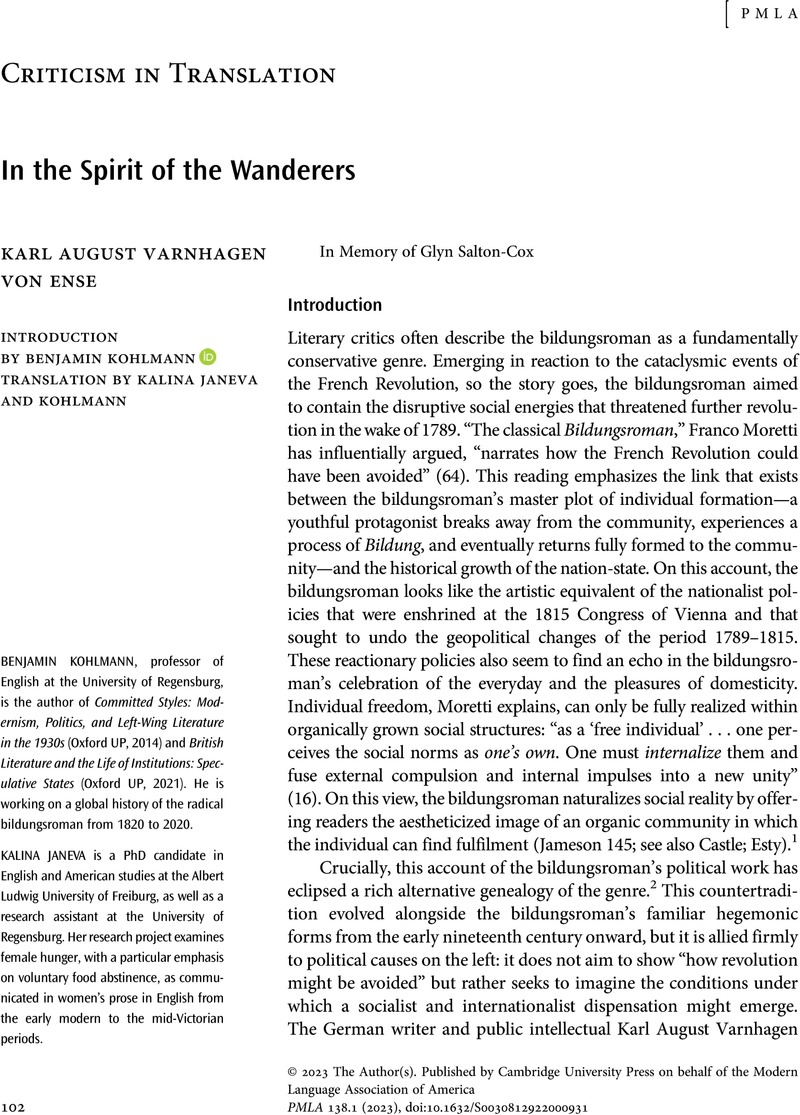No CrossRef data available.
Article contents
In the Spirit of the Wanderers
Published online by Cambridge University Press: 07 March 2023
Abstract
An abstract is not available for this content so a preview has been provided. Please use the Get access link above for information on how to access this content.

- Type
- Criticism in Translation
- Information
- Copyright
- Copyright © 2023 The Author(s). Published by Cambridge University Press on behalf of the Modern Language Association of America
References
Works Cited
Amrine, Frederick. Goethe and the Myth of the Bildungsroman: Rethinking the Wilhelm Meister Novels. Cambridge UP, 2020.CrossRefGoogle Scholar
Boes, Tobias. Formative Fictions: Nationalism, Cosmopolitanism, and the Bildungsroman. Cornell UP, 2012.CrossRefGoogle Scholar
Boes, Tobias. Introduction to “On the Nature of the Bildungsroman,” by Karl Morgenstern. PMLA, vol. 124, no. 2, Mar. 2009, pp. 647–49.Google Scholar
Engels, Friedrich. Review of Über Goethe vom menschlichen Standpunkte, by Karl Grün. Marx-Engels Werke, vol. 4, Dietz, 1971, pp. 222–47.Google Scholar
Esty, Jed. Unseasonable Youth: Modernism, Colonialism, and the Fiction of Development. Oxford UP, 2013.Google Scholar
Goethe, Johann Wolfgang von. Wilhelm Meisters Lehrjahre. Edited by Trunz, Erich, dtv, 1998. Vol. 7 of Werke: Hamburger Ausgabe.Google Scholar
Goethe, Johann Wolfgang von. Wilhelm Meisters Wanderjahre, oder die Entsagenden. Edited by Trunz, Erich, dtv, 1998. Vol. 8 of Werke: Hamburger Ausgabe.Google Scholar
Gregorovius, Ferdinand. Göthe's Wilhelm Meister in seinen socialistischen Elementen entwickelt. Bornträger, 1849.Google Scholar
Jameson, Fredric. The Political Unconscious: Narrative as a Socially Symbolic Act. Cornell UP, 1981.Google Scholar
Kindt, Tom. “Goethes Spätwerk. Zur Wissenschafts- und Begriffsgeschichte einer ‘Entdeckung.’” Goethes Spätwerk / On Late Goethe, edited by Sina, Kai and Wellbery, David E., De Gruyter, 2020, pp. 253–67.CrossRefGoogle Scholar
Kohlmann, Benjamin. “Toward a History and Theory of the Socialist Bildungsroman.” Novel, vol. 48, no. 2, 2015, pp. 167–89.CrossRefGoogle Scholar
Moretti, Franco. The Way of the World: The Bildungsroman in European Culture. Verso, 2000.Google Scholar
Piper, Andrew. “Rethinking the Print Object: Goethe and the Book of Everything.” PMLA, vol. 121, no. 1, Jan. 2006, pp. 124–39.Google Scholar
Spoerhase, Carlos. Das Format der Literatur: Praktiken materieller Textualität zwischen 1740 und 1830. Wallstein, 2018.Google Scholar
Varnhagen von Ense, Karl August. “Brief an Goethe, 28. Dezember 1831.” Briefe an Goethe, vol. 2, edited by Mandelkow, Karl Robert, Verlag, Wagner, 1968, pp. 597–98.Google Scholar
Varnhagen von Ense, Karl August. “Im Sinne der Wanderer.” Ueber Kunst und Alterthum, vol. 6, 1832, pp. 533–51.Google Scholar
Varnhagen von Ense, Karl August. Letter to Rahel Varnhagen. 20 Mar. 1848. Bonhams, www.bonhams.com. Accessed 20 Sept. 2020.Google Scholar
Wundt, Max. Goethes Wilhelm Meister und die Entwicklung des modernen Lebensideals. De Gruyter, 1932.CrossRefGoogle Scholar


